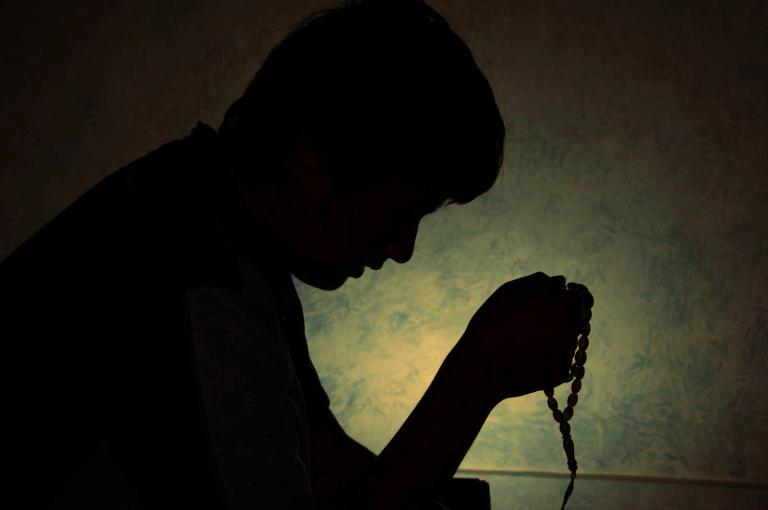
After returning from the mosque years ago, one of my students remarked, “I was hoping we would have heard from a real Muslim.” What is a real Muslim?
My world religions class has the privilege several weeks during the semester to hear from leaders of various faith traditions: Jewish, Muslim, Mormon, Pagan, Hindu, and Buddhist. During the semester in which the student made the remark years ago, the Muslim leader in question was a white American convert to Islam and a member of the Ahmadiyya Muslim community. In fact, he was the President of the Mosque that year.
Perhaps my student thought a real Muslim is an Arab with a beard. Not all Muslims have beards. There are more Asian Muslims than Arab Muslims in the world. There are also Muslims with blonde hair and blue eyes, as Malcolm X realized on his pilgrimage to Mecca.
Today, my class had the opportunity to hear from a Muslim of Pakistani descent. So I asked him, “What is a real Muslim?” While he did not wish to discount other branches or traditions within Islam, he did highlight his own community’s emphases.
The fundamental distinctive of the Ahmadiyya Muslim movement is that the Messiah has already returned. Contrary to many Muslims, the Messiah who returns is not literally Jesus, but the person who founded their movement. For the Ahmadiyya Muslim community, the fundamental weapon in warfare is the pen, not the sword. Perhaps my student year ago was surprised and disappointed that the white Muslim leader representing the Ahmadiyya Muslim community emphasized tolerance and reason and framed Sharia law as representing democratic ideals. He was so nice and so American.
Now, I am well aware of the fact that many Muslims do not view the Ahmadiyya Muslim community as an authentic form of Islam, though it claims to belong to the Sunni tradition. I should add that large swaths of Sunni and Shia Muslims do not see one another’s branch as authentic either.
So, who gets to decide what a real Muslim is? Certainly, not Christians. Muslims must determine among themselves what a real Muslim is. Regardless, though, the question does raise other questions, like what makes for determining factors for any faith tradition. Is it doctrine? Ritual? Practice? Lineage?
Terms like “Muslim” or “Christian” or “Buddhist” do not have essentialist, eternal meanings. Rather, terms only have meaning in historical and communal contexts of usage, including verses in sacred writings.
I come across many Christians who maintain that real Muslims are those who pick up the sword to destroy the ‘infidel.’ These Christians point to certain passages in the Quran to make their case. But with any religious group, Jewish and Christian included, there are multiple ways in which texts are interpreted and applied. Most Christians I know would not acknowledge Westboro Baptist Church as an authentic representation of Christianity, though Westboro Baptist Church claims to take to heart certain biblical passages as foundational to their teaching and practice.
Jesus said that false prophets or ravenous wolves will be known by their fruit (Matthew 7:15-20). What is the fruit? The teaching, the practice, both, something else? Those who claim to be Christian will need to sort out authentic Christianity among themselves, just as Muslims will need to sort authentic Islam for themselves. By our fruit, we will all be known.
Religion is not static, stationary or mechanical, but elastic, evolving, and organic. Since that is the case, should a certain nationality, hair and eye color, attitude toward outsiders, or even particular interpretation of a sacred text prove definitive for understanding a given religion?
So, what does prove definitive? How does one limit the semantic range given that today some claim to be Buddhist Christians or Christian Buddhists, and beyond? Whether anyone will claim to be a Christian Muslim or Muslim Christian, there are certain delimiting factors to consider in ascertaining what a real Muslim or real Christian is. The individuals in question will seek to account in some manner for definitive Scriptures such as the Quran or the Bible, foundational figures like Muhammad or Jesus, and the Muslim or Christian tradition and community. No one who claims to be a Muslim could ever renounce Muhammad as the great prophet. No one who claims to be a Christian could ever renounce Jesus as Lord.
In seeking to discern what a real Muslim or real Christian is, we can say that whether their eyes are brown or blue or green and they are American or Pakistani or Chinese, they really want to be authentic in their adherence to their faith traditions and their founders. While we can differ on the meaning of terms, there is no place for being a Muslim or Christian in name only.












